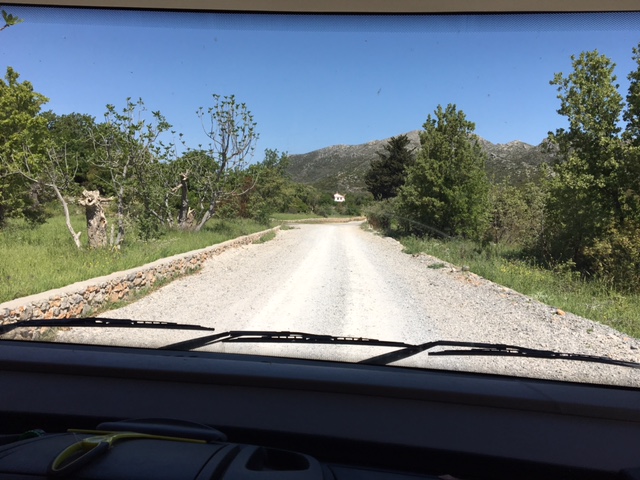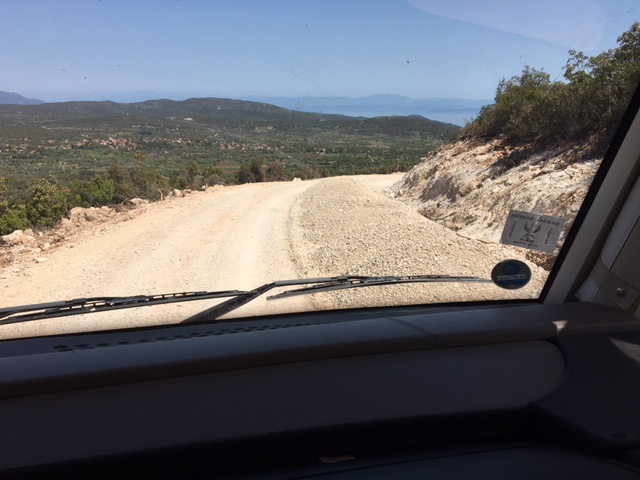We bade farewell to our lovely beach near Monemvasia today as Basil hauled his lardy backside northwards to the tiny harbour of Plaka, about half way up the east coast of the Peloponnese. I hadn’t thought before that we have already reached the southernmost point of this year’s journey, when we wildcamped at the tip of the Mani peninsular. From now on it will be always northwards until, if our plans are fulfilled, we reach Nordkapp, the most northerly point of mainland Europe, in Norway.
It turned out that Greece was not going to let us get away with two easy journeys in a row. Our route took us on a small coastal road for nearly 50 miles. We should have known by now that mountains would be the order of the day. The Peloponnese appears to be all mountains. The scenery on our journey was almost the definition of rugged. In the whole route we saw barely any sign of agriculture. Where the ground was not too steep to plough a field, it was instead covered in large boulders. Shrubby trees and wild flowers could find enough room to grow, sometimes in profusion, but not enough space anywhere to meaningfully grow crops, not even the elsewhere ubiquitous olive tree. No wonder there are so few settlements to the east of the Peloponnese.
We saw the odd small herd of goats and one herd of sheep, wandering the roadside and in one place a small patch of land had been cleared and planted with vines, but the farmer was present with a tanker watering his apparently well established plants. When you have to manually irrigate vines with water brought in a lorry specifically for the purpose, you know farming is hard.
The road was as rugged as the land. Up and down; twist and turn. 49 miles in two and a half hours! The roads were mostly of good quality, although a few of the villages were a tight squeeze, but nothing Basil can’t deal with after the shenanigans of our first encounter with Greek mountain villages, in the north west of the Peloponnese.
There were a couple of exceptions to the good quality road theme, where the Greeks seemed to have fallen asleep on the job, or perhaps, more charitably, run out of money in these straightened times for the Greek economy. In a first for Greece we approached one village to be greeted by a “no heavy vehicle sign”. We now know better than to ignore such a warning. No problem. We were directed onto one of the world’s smallest bypasses, around this tiny settlement. Suddenly though, the tarmac disappeared and we were slithering on a loose gravel surface. This continued for half a mile or so until the proper road started again. There was no road building machinery present and no sign of continuing work. The bypass appeared to have been finished, just with a half mile gap in the middle!

Where did that bypass go?
Much more worryingly, we were driving steeply downhill on a main(ish) road when again the road suddenly turned from tarmac to loose hard core. It’s one thing to drive Basil on a level piece of loose gravel; controlling his large frame on a downhill 20% gradient, complete with hairpin bends, is another matter altogether. The unmade section was probably two miles long, with no barriers and big drops off the side of the road. Greece has given me yet another memorable driving experience, but not in a good way!

You’re in a 4 ton vehicle, driving on gravel, you’re going down a steep hill, there’s big drop, there’s a corner approaching, there’s no guard rail, you have no grip, – what do you do? Pray!
We eventually arrived at Plaka, directed by SatNav to the only supermarket on our route. The “supermarket” was only in the imagination of SatNav’s database. In reality it was smaller than the smallest village shop in Britain. Once inside I felt obliged to find a few things to buy, but our shopping list remained largely unfilled.
Camping Semeli, our final destination, was only a mile or two up the road and turned out to have a shop bigger than SatNav’s “supermarket”. It’s a nice little campsite (37.149341, 22.892638), which is not on the ACSI scheme, but still only €16 a night. It is situated on a lovely beach of mixed sand and shingle and is only 300 yards from a pretty little harbour with several tavernas. That may be where we are heading tonight.
The wifi is again fairly fast, as it has been on virtually all of our Greek campsites. It brings into sharp focus the performance of Britain’s internet infrastructure provider’s, BT’s, performance. Plaka is a tiny community, isolated from any sizeable centre of population by at least 50 miles of extremely mountainous terrain and yet is still has good internet connectivity. But all over Britain, including in our home county of Lincolnshire, there are many reasonable sized communities, within a few miles of a city bigger than anything on the Peloponnese, which still have no proper internet connectivity. Come and look at how Greece manages it BT. Pull your socks up!
